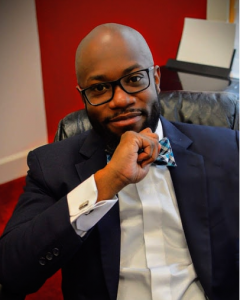The seemingly rapid rise of the MAGA movement and Christian nationalism may be shocking to some, but they in fact derive from the nation’s long-time infatuation with fascism, according to theologian Willie D. Francois III.
“America has always been a little authoritarian. Maybe America has not been completely totalitarian, but America has always been a little totalitarian,” he said during a plenary session of the Philadelphia Baptist Association’s 2024 Missiological Conversation themed “Addressing a Surge in Authoritarianism at the Intersection of Faith and Policies.”

Willie D. Francois III
Francois serves as professor at New York Theological Seminary and author of Silencing White Noise: Six Practices to Overcome Our Inaction on Race and is senior pastor at Fountain Baptist Church in Summit, N.J.
His fellow presenter on the panel was Kirsteen Kim, a theologian, author, global missiologist and professor at Fuller Theological Seminary.
The association partnered with American Baptist Home Mission Societies to present the May 2 hybrid event on how mixing Christian belief, white supremacy and authoritarian governance leads to fascism.
The germs of American fascism have sprouted in numerous ways throughout history, no less than through the practice of chattel slavery, Francois noted. “When you think about what this country is, there were 10 generations of race-based slavery. There have only been six generations of freedom. We have only been free as Black people for six generations. We were slaves longer than we have been free.”
“The concept that we have lived and nurtured and have been a part of some grand democratic project is not real.”
And the United States can be accurately considered a multiracial democracy for only the last two of those generations, he added. “You cannot really call America a democracy until 1965, when you have the Voting Rights Act. So, the concept that we have lived and nurtured and have been a part of some grand democratic project is not real.”
None of this is surprising to the Black church, Francois said. “We as followers of the Carpenter — the followers of Jesus — have had to reckon with the fact that fascism is not something new. Authoritarianism is not something that lives across the pond or in some distant memory. We actually live in a country that has never lived up to its democratic ideals.”
Despite the oppression they have faced, Black Christians have helped demonstrate a decidedly anti-fascist way of being American, he asserted. “Black churches have been incubators of democratic practice and incubators of revolution and resistance.”
Francois said the historical and present-day manifestations of fascism have prompted him to ask what some Americans find attractive about authoritarianism. “I have been wrestling more and more with the concept of how a nation, and how a capitalist economy, traumatizes us into looking for solutions and answers that belie our very nature, that belie how we engage in the world.”
Easy answers to the question must be avoided, especially those that vilify Americans enamored with autocratic groups and candidates, he said. “We are talking about people who love their children. We are talking about people who love a version of Jesus even if they don’t follow that Jesus. We are talking about people who, probably in most accounts, are not hateful. They probably have Black friends and they probably have queer persons who are part of their larger orbit.”
But many of them share trauma inflicted by unjust social and economic conditions that fascist movements promise to heal. Acceptance begins with tolerance for a movement’s radical aims before morphing into an embrace of its tenets and the willingness to actively seek in its expansion, he said.
“What prepares men for totalitarian domination is loneliness.”
Growing social and relational isolation also creates favorable conditions for the spread of fascism, Francois added. “What prepares men for totalitarian domination is loneliness. We see it over and over that people are lonely. You can believe a totalitarian or fascist leader because there is something in our society that is broken.”
These questions are worth asking because fascism requires a comprehensive understanding of its social and economic causes, he said. “It is easy for us to think about the leader, the demagogue, who becomes the face, who drives that shift. It is easier for us to think about a system of government that rapes and denies and fragments who we are as people.”

Kisteen Kim
The United States’ fascist and white supremacist tendencies have long been apparent to those in other nations, said Kim. “During the Cold War, the U.S. was claiming to be democratic and free at home, but it was exposed on the issue of race, and also it was supporting extreme right-wing and fascist regimes elsewhere in Latin America, in East Asia and so on in order to rollback communism.”
She noted fascism is often closely connected to authoritarianism and is complicit with imperialism, patriarchy and racism. “And I want to say this is not unique to the U.S.”
But the surge of nationalism and white supremacy is fostering ripe conditions for fascism in the U.S., she added. “Nationalism can be a really good thing for building up a country, but when it becomes the ideology, it seeks the good of the nation by beating down everybody else. And there’s an urgency to win at all costs because there’s an enemy — perhaps a created enemy, perhaps a real enemy, but it’s there.”


